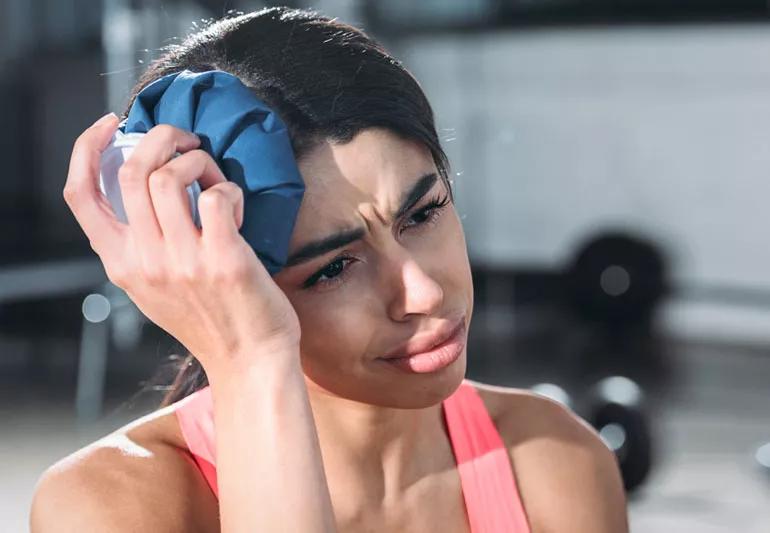Repeated trauma over time can have a cumulative effect

Image content: This image is available to view online.
View image online (https://assets.clevelandclinic.org/transform/5cb0600f-730b-48ee-9d79-7901792aafe0/concussionHurt-1098345886-770x553-1_jpg)
woman with ice on concussed head
Scenario one: You’re playing ball, get beaned in the head and start to feel nauseous and dizzy. Uh-oh. You know there’s a possibility of a concussion, so you go to your nearest emergency room.
Advertisement
Cleveland Clinic is a non-profit academic medical center. Advertising on our site helps support our mission. We do not endorse non-Cleveland Clinic products or services. Policy
Scenario two: Same ballgame, same beaning, but you feel fine. No need to worry or see a doctor, right?
Well, you may want to reconsider. In this Q&A, concussion expert Richard Figler, MD, discusses these minor head injuries, called subconcussive hits, and their impact on the brain.
A: A concussion happens when you get hit in the head hard enough to cause a transient disturbance of brain function or causes your brain not to function normally. You experience symptoms ranging from headache, dizziness or nausea to feeling confused or out of it. A “mild” concussion is one that is not life-threatening but typically requires a doctor’s care.
So if you took a small hit to the head and had any concussion symptoms, you should leave the activity right away. You should then have a doctor examine you to rule out a concussion. (We would consider it a concussion until proven otherwise.)
A subconcussive blow is one rung below a mild concussion. You get hit in the head but you don’t experience symptoms. In this case, we would not suspect a concussion (but symptoms can come on hours after hit, so monitor closely). However, this minor blow may still cause damage over time. We would be naïve to think there’s not some force that’s transmitted to the brain from these milder hits. We simply don’t know enough about these milder hits to definitively say how dangerous they are.
Advertisement
A: There have been studies on accelerometers (a device which measures acceleration) and helmets, but the data is difficult to interpret because:
I’ve had situations where athletes — who often sustain blows to their heads — have gotten concussions from a small unexpected hit on the back of the head. While soccer and football players often develop neck strength that may absorb smaller blows, if they receive a hit they’re not ready for, they can be out for two or more weeks with a concussion because they never had time to prepare for that unexpected hit.
A: While the younger brain may heal faster, we also know that the developing brain in younger people is probably more irritated by subtle blows to the head. As athletes get older, we think the brain can withstand a little more force.
Plus, younger people may not report concussion symptoms because they don’t know they’re having them. Children are notorious for not being able to explain what a headache is or exactly how they’re feeling. So we can’t definitively say that the younger athlete can sustain these minor blows without any significant repercussions.
The takeaway is we need to protect younger athletes:
A: You should visit an emergency room if you experience serious symptoms, such as:
Follow up with your doctor about hits to the head that cause both major and minor concussion symptoms. More minor symptoms include:
Advertisement
But pay attention to anything that would make someone stop play and not be able to continue for even a short time. The motto is “When in doubt, sit them out.” Remember: It’s safer to err on the side of caution. Even if you don’t experience concussion symptoms, call your doctor if you have any concerns following a subconcussive impact.
Physician visits are especially important for athletes that sustained concussions because we need to ensure their health before they return to play. We can work with them on symptom reduction faster than they could on their own. We also offer guidelines about how to:
And we emphasize concussion education. We help you recognize the signs of a concussion so you can pull yourself out of play sooner. You’ll recover faster than someone who stays in the game with concussion symptoms.
Advertisement

Sign up for our Health Essentials emails for expert guidance on nutrition, fitness, sleep, skin care and more.
Learn more about our editorial process.
Advertisement
Watch for severe symptoms in older kids and adults, but kids under age 2 should always see a provider
Getting back to normal after a head injury takes time — and patience
Bolsters, blankets, pillows and blocks can offer extra support, stability and comfort
Goals that are specific, measurable, attainable, relevant and time-bound can support improvement in your health and wellness
A type of high-intensity interval training, boxing can challenge your body and mind
It’s an emergency if the pain doesn’t go away, gets worse or you have other worrying symptoms
Your diet in the weeks, days and hours ahead of your race can power you to the finish line
Squats are foundational for building strength in your legs, glutes, quads and core muscles
Prioritize your health by managing stress, strengthening your social connections and getting quality sleep
Bolsters, blankets, pillows and blocks can offer extra support, stability and comfort
Allergies, postnasal drip, asthma or reflux could be to blame for a cough that won’t quit